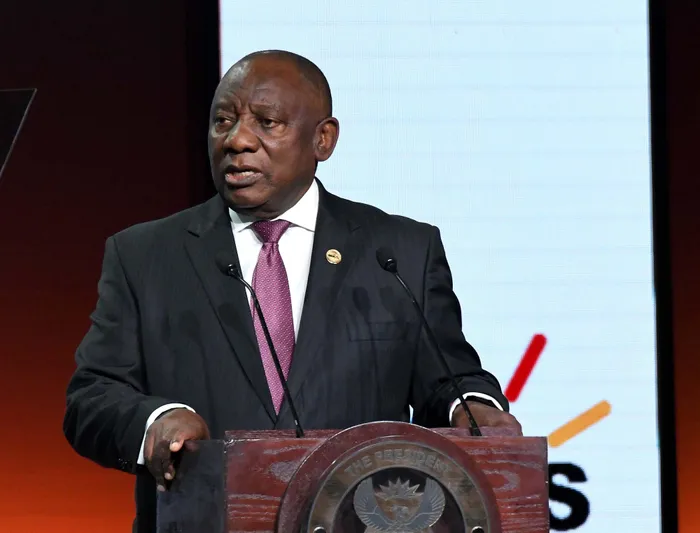Domestic demons haunt Ramaphosa despite summit praise

President Cyril Ramaphosa addressing the BRICS summit Picture: GCIS.
Prof. Bheki Mngomezulu
The 15th BRICS Summit will go down in history as the most important gatherings of this formation since its inception on June 16, 2009.
First, it was challenged by the warrant of arrest issued by the International Criminal Court (ICC) against Russian President Vladimir Putin.
For months, it was unclear if Putin would attend the summit hosted by South Africa. As the signatory to the Rome Statute in 1998, and as one of the founding members of the ICC in 2002, South Africa was expected to arrest Putin if he came to Soth Africa. Thankfully, he opted not to come, thereby saving South Africa from a tough test, like that of 2015 when Sudan’s then-president Omar al-Bashir faced the same situation.
The second test was to see who was going to be invited to attend the summit apart from the other four members (Brazil, Russia, China, and India). President Cyril Ramaphosa’s decision to invite countries from various continents confirmed the country’s non-partisan stance.
Third, was the question on how South Africa would manage the East/West rivalry, especially in terms of the de-dollarisation of the payment system which is seen as an attempt to make the US dispensable in geopolitics. The fact that an agreement was reached on the matter, with the insertion that the ministers of finance of the member states, would work out the finer detail was a breakthrough.
The fourth test was how the summit would deal with the list of countries that expressed interest in joining the BRICS bloc. Drawing lessons from the EU, where some countries were prevented from joining this group by some members who had political differences, the expectation was that this would be one of the hardest nuts to crack.
Surprisingly, while it is true that serious discussions had to ensue before any decision could be reached, it is now history that two African countries (Egypt and Ethiopia), one country from South America (Argentina) and three oil-producing countries from the East (Iran, South Arabia, and United Arab Emirate) were welcomed to join the BRICS group as from January 2024. This was history in the making.
The fifth milestone reached by South Africa was to invite UN Secretary-General Antonio Guterres to the summit. During his address, Guterres stressed the need for a multipolar world. Among other things, he called for the reform of the UN Security Council and the Bretton Woods institutions – something other countries (including those in Africa) have been calling for.
In a nutshell, the 15th BRICS summit elevated Ramaphosa as the chair and host of the summit. His global image has been significantly boosted, as evidenced in the accolades he received from his BRICS counterparts.
But the key question which begs for attention is: Has the summit saved the president from his domestic woes? My response is in the negative. There are various reasons for my stance.
First, South Africans do not understand why BRICS matters to them. This is because decisions are taken in boardrooms and the agreements signed are discussed at a macro level which is not accessible to the man on the street. Therefore, while the world continues to praise Ramaphosa, these people are focused on domestic politics and the things that their president has either done or failed to do. Whether the BRICS summit was a success, means nothing to the many people on the ground.
Second, on the eve of the summit, the South African Reserve Bank (SARB) released a controversial statement in which it stated that evidence collected from 15 affidavits and other sources had led it to the conclusion that neither Ntaba Nyoni CC, as a company, nor Ramaphosa was guilty of any offence regarding thousands of US dollars that were stashed at the president’s Phala Phala farm.
For many South Africans, this amounts to travesty of justice. The BRICS summit cannot erase the feeling such people have about Ramaphosa when it comes to domestic politics.
Third, the BRICS Summit coincided with the conclusion of the Section 194 Parliamentary Committee. This is one issue that had been clouded in controversy from day one. Ramaphosa invoked Section 194(3)(a) and suspended public protector Busisiwe Mkhwebane. Coincidentally, he did this soon after Mkhwebane had announced that she was going to investigate the Phala Phala matter.
Noticeably, the section states that the president “may suspend a person from office at any time after the start of the proceedings of a committee of the National Assembly for the removal of the person”. The question becomes: When Ramaphosa suspended Mkhwebane, had the process started?
BRICS did not erase the concerns; hence United Democratic Movement’s Bantu Holomisa wants to have access to SARB’s findings.
Professor Bheki Mngomezulu is director of the Centre for the Advancement of Non-Racialism and Democracy at the Nelson Mandela University
The views expressed do not necessarily the views of Independent Media or IOL